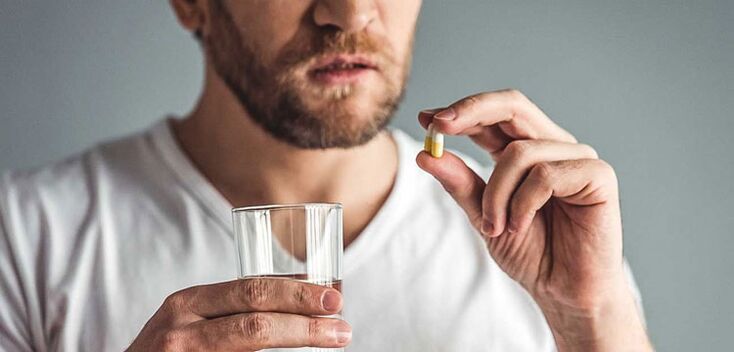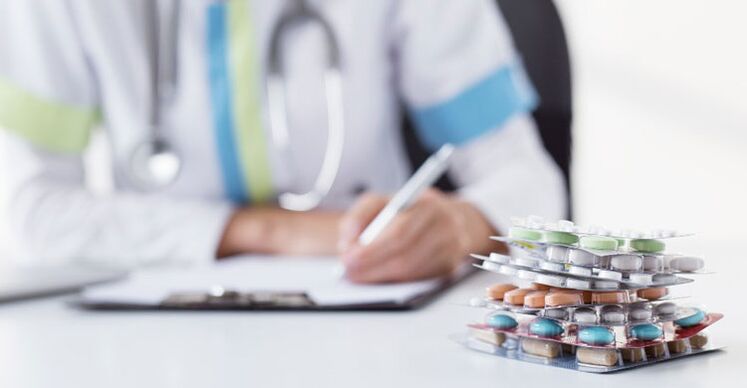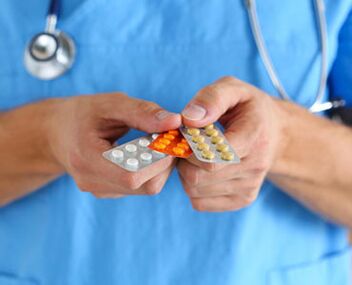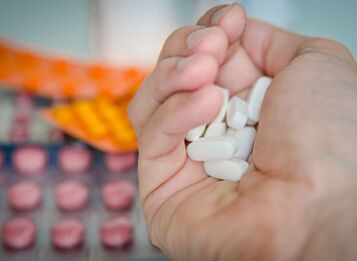
Inflammation of the prostate gland requires complex long-term treatment. Drugs for prostatitis in men are selected individually. The choice of drugs is influenced by the degree of advanced disease, the presence of complications and the presence of a bacterial or infectious factor.
The therapy is conservative. Treatment is considered effective if it is possible to eliminate inflammation and restore the basic functions of the prostate.
Is it possible to get rid of prostatitis with drugs?
Urologists prefer to use the term "persistent remission". With the help of comprehensive drug treatment it will be possible to eliminate inflammation and restore the prostate. There is the possibility of relapse. But if the therapy is carried out correctly and the patient follows the doctor's recommendations and takes care of his health, the probability of the pathology recurring is minimal.
On the other hand, it is impossible to get rid of prostatitis without resorting to medications. Even at an early stage, tissue changes are irreversible. Any alternative method of medicine eliminates only symptomatic manifestations. Prostatitis becomes chronic, develops latently and then recurs at an already advanced stage.
Combined drug treatment for inflammation of the prostate is the only reliable way to defeat the disease. After completing the mandatory course of taking medications, physiotherapy and exercise therapy sessions are carried out to consolidate the results.
What drugs to take for prostatitis
As noted above, the treatment of abnormalities of the male reproductive system is complex. There is no single remedy that can cope with the disease.
For prostatitis it is necessary to take the following drugs at the same time:
- Relieve inflammation.
- Elimination of the infectious factor.
- Block pain and facilitate urination.
- Restore the functionality of the prostate gland and improve blood circulation.
The course of therapy will be selected by the urologist based on the patient's health condition. Self-medication is harmful and dangerous. Taking painkillers should also be discussed with your doctor.

Anti-inflammatory drugs
Medicines belonging to the group of NSAIDs or NSAIDs. Nonsteroidal anti-inflammatory drugs quickly relieve flare-ups, eliminate pain, and reduce body temperature. NSAIDs are the first aid for prostatitis.
The main effect is associated with the inhibition of the cyclooxygenase enzyme, mediator of the inflammatory process. The active components at the cellular level block the action of COX.
Medicines for the treatment of prostatitis are produced:
- In tablets.
- Injections.
- Enema Solutions.
- Rectal suppositories.
The disadvantages of all NSAIDs are their negative effects on the gastrointestinal tract. Long-term use leads to the development of gastritis and peptic ulcers. Newer drugs have reduced side effects, but have not eliminated them completely.
If long-term use of anti-inflammatory drugs is necessary, preference is given to suppositories and rectal injections.
In addition to relieving inflammation, drugs from the NSAID group have antipyretic and analgesic effects.
For pain and spasms

Good remedies for prostatitis quickly relieve negative symptoms and eliminate some catalysts of inflammation. To relieve pain and spasms, two groups of drugs are prescribed:
- Analgesics help well during an exacerbation.
- Antispasmodics. For severe spasms, belladonna tincture and a relaxant are recommended, which relieves tension in the muscle tissue and normalizes urination.
When it comes to eliminating pain and spasms, cheap medications are often the most effective. In 85% of cases, unpleasant symptoms can be overcome by simultaneously taking an antispasmodic and an analgesic. In case of contraindications and presence of peptic ulcer, rectal suppositories are prescribed.
Antibiotics
Antibacterial drugs are aimed at eliminating infections, pathogenic microorganisms, bacteria and fungi that cause a serious inflammatory process.
Antiviral drugs are selected separately in each specific case. To begin with, during laboratory tests, healthcare professionals try to identify the catalyst of the disease. Accurate differentiation of the infection and clinical testing for antibiotic resistance are required to prescribe effective therapy.
If bacteria or other pathogens cannot be determined with certainty, or if simultaneous infection by several microorganisms occurs, broad-spectrum antibiotics are prescribed. Infectious prostatitis, caused by staphylococcus and Treponema pallidum, is the most difficult to treat.
The course of drug treatment includes a complex of drugs: antibiotics of various effects. Bacteria adapt quickly to a negative environment and are elastic and resistant to antiseptics.
Hormonal
Drugs are prescribed if anti-inflammatory, diuretic and analgesic tablets for prostatitis do not have the necessary effect.
Additional Benefits of Hormones:
- Increased sexual desire.
- Restoration of erectile function.
- By blocking the proliferation of glandular tissues and facilitating the outflow of urine.
Chronic inflammation in an advanced stage turns into cancer. In this case, the principle of therapy changes: it is necessary to stop the production of testosterone by the body or the absorption and processing of hormones by the glandular tissues.
If antiandrogen blockade does not help, surgical castration is recommended: removal of one or two testicles.
Herbal remedies
The best drugs for prostatitis today are based on a concentrated extract of pumpkin seeds and plants. The effect of herbal medicines repeats the effect of synthetic medicines:
- Relieves inflammation.
- Improves blood circulation.
- Stimulates the functioning of the immune system.
- Relieves the symptoms of the disease.
- Strengthens erection and libido.
Some natural medicines fight infectious agents, but they cannot completely replace antibiotics. Although the phytogroup of medicines has a positive effect, it cannot completely replace traditional medicines. The reason lies in the slow effect on the human body. Urologists consider herbal medicines in tablets or suppositories more for the prevention of the disease.
The course of herbal treatment is effective in the early stages of prostatitis, as well as during the period of remission of the disease. Combined use is allowed during the main therapy. General recommendation: take herbal medicines at least once every six months after the acute inflammatory process has ceased. The course of preventive measures will be prescribed by the attending physician.
Despite their relative harmlessness, herbal medicines can only be taken on prescription from your doctor. Self-prescription of drugs for inflammation of the prostate is harmful to the health of the male reproductive system.
How to take medications correctly
Prostatitis is a prolonged and recurrent disease. Both the inflammatory process itself and its consequences are dangerous. Neglected pathology leads to infertility and the development of cancer.
To deal with prostatitis it will be necessary to undergo a long course of drug therapy. Some drugs are harmful to the body. To reduce the negative impact, several urological recommendations have been developed:

- Drugs that normalize blood circulation are prohibited in severe forms of anemia, before and after surgery. Furthermore, the simultaneous use of several anticoagulants is excluded.
- Antibiotics deal a serious blow to the intestinal microflora. In addition to prescribing treatment, protection of the gastrointestinal tract is provided in the form of probiotic drugs. To increase the effectiveness of probiotics and quickly restore the microflora, fermented milk products: kefir and yogurt are introduced into the diet.
- If such a possibility exists, the tablets are replaced with suppositories and injections. Some rectal suppositories are analogues of drugs for prostatitis in the form of tablets, but act faster and do not cause harm to the gastrointestinal tract.
- Select medications with minimal side effects. Preference should be given to modern drugs for the treatment of prostatitis. Antibiotics and NSAIDs are less harmful to healthy cells in the intestine and stomach.
And the last rule is a prolonged illness, this is a serious blow to the patient's psyche. Wanting to get rid of inflammation, a man can start experimenting, taking at least questionable drugs that helped someone else.
The list of drugs to combat the pathology is compiled only by a urologist after a comprehensive examination of the body. Self-medication nullifies all the positive results obtained and can cause severe intoxication of the body. The main rule in the fight against prostatitis is "Do no harm! "
























